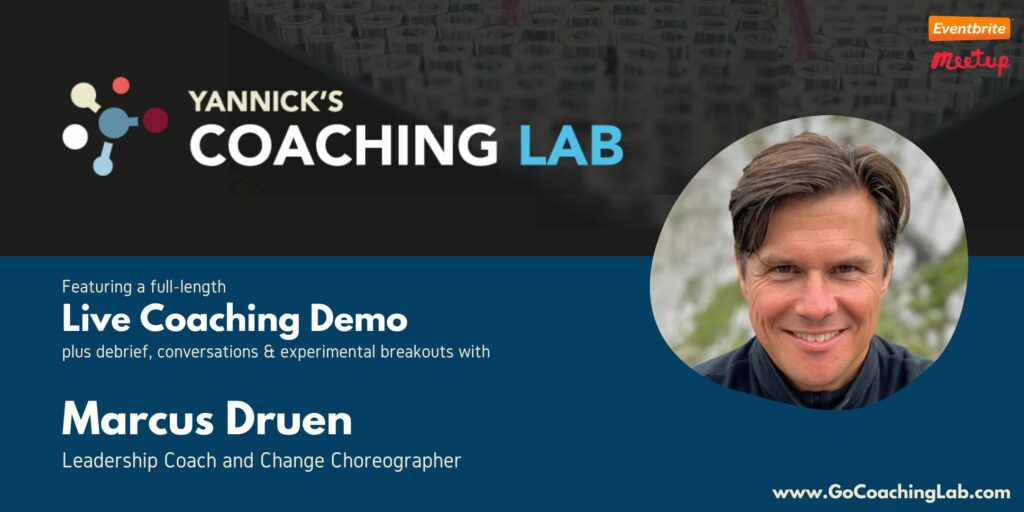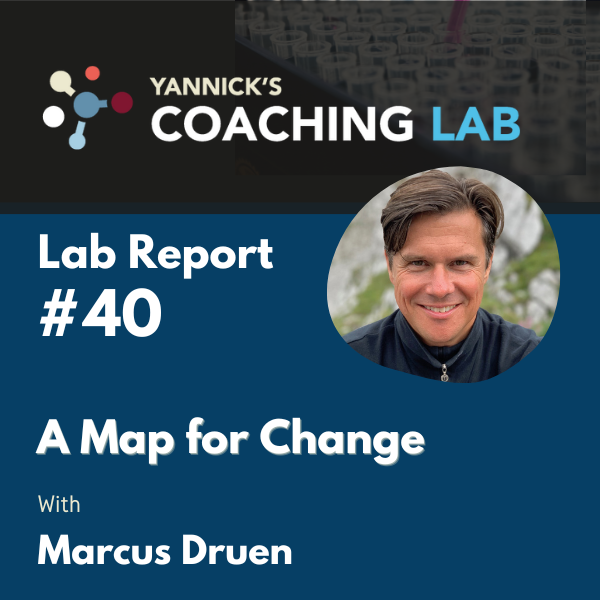
Yannick’s Coaching Lab features guest coaches from a broad variety of approaches, who showcase how they work as part of a live 45min coaching session, followed by reflections and Q&A with the audience.
Curious to know what this session was like? Have a peek at the Lab Report below or consider VIP membership to access the full recording of this and many more exciting sessions.
Yannick’s Coaching Lab #40 — Marcus Druen
Lab Report by Natalie Fraser
Summary
Marcus offers a coaching style rooted in several approaches, including a rich background as a leadership coach and change catalyst for large organisations. In this session he shared his interactive process “A Map for Change”, allowing the session to be led by energetic vibrational sense work and the program Miro. Marcus has used his ‘Psychadelic map for change’ PMFC for 20 years. The dimensions: self – group – organization – humanity – earth – cosmos are explored in hierarchy, looking first at what already exists within the client’s reality rather than what the change should be. This contrasts with the grow model which focuses first on change. The philosophy is if we can accept what is, we are in a much better place to experience change. Everything takes the path of least resistance, so if we want to create change, we want to create structure according to this principle.
Marcus and his client met before this session for a conversation. It was identified that finding point B (the direction of where to go with the session) was difficult, and the client was feeling a bit lost. No obvious goal was stated. Instead, Marcus explained that he holds a container, ‘a macro-frame’, to give space to emerging topics. Marcus’s client is experiencing challenges related to their life achievements. They have lost themselves in parenting and are recently noticing that peers who started at the same time in the corporate world are now being promoted to partners. This perpetuates a sense of not having excelled, feeling sour, and with a deeper challenge of whether of not she’s a good person surfacing.
Key Insights
A Map for Change started the session which Marcus had created based on a short (15 or so minute) meeting with his client before the session asking three question:
What’s going well for you? (green)
What’s puzzling you? (yellow)
What’s holding you back? (red)
From these questions and in accordance with his PMFC, Marcus used the computer program Miro to produce an overview of what his client had shared. Color-coded ‘post-it notes’ were used to relate her experiences with the questions, and the start of the session invited his client to reflect on these. In this session, Marcus organized the post-its beforehand for the sake of time. Normally, this would be a co-creation within the session or a project the client can do between session.
Past and Present Dimensions were explored, revealing that much of the ‘red’ is related to the ‘shoulds’ of the past. The current challenge of the present was found to relate to ‘what could have been’ and questions of whether she is a good person, a good mother, and has made good career choices.
What do you get right? Having explored the ‘red post-its’ negative experiences, Marcus drew his client towards focusing on the ‘green post-its’ positive experiences revealing the themes of love and support that are prevalent within the client’s world.
How do you define success? Invited the client to consider and challenge their view of not having achieved what they could have. Marcus reflected: “I see you define success as something that you’ve not had by the standards that you hold, yet what I see is so much success in the main role that you’ve chosen for the last few years.”
Life mirroring career is a theme that Marcus found, noticing that his client seeks validation by comparison in both career and life. Sensing deeper, this was found to relate to his client’s cultural history including achieving being ranked number one and this being an important part of their identity. Throughout the session, Marcus offered the client compliments on their achievements at time drawing comparison to his own life experiences and challenges. Other mirrors included the client’s passion for creating, and for caring for others and the wider humanity.
Energetic Vibrations were felt and spoken by Marcus who worked with his client to detect the ‘underlying vibrations’ that are creating the story. An example of this exploration was the differentiation between shame (which the client did not feel) and nervousness (which the client did feel). Control was a source of discomfort – balance was a source of harmony.
Marcus shared his personal experiences in reflecting back how his client is actively prioritizing 50-60% of their life to motherhood, praising her, and sharing that this was not how he experienced fatherhood and his awareness that he cannot get this time back.
Marcus drew on his own expertise contrasting corporate and coaching (both his and his client’s career paths in that order). He invited her to lean into her emerging future from a new perspective: creating and shaping life vs. life happens through you, you are a vessel, a change choreographer. From doing to being.
To close the session Marcus offered a powerful take-away question that reiterated choice within the freedom of self-employment: “If you are wildly successful in whatever dimension that is important to you, what title would you really want to have that makes you not what other people use because you’ve found something that fits with your shape.” Become whoever you want to be.
Lab Key Take-Aways
Marcus brought himself into the process more than other coaches might, using interpretation, judgement, resonating, intuition, and feeling vibrational energy to guide and lead the session.
Marcus’s approach surprised the client (and audience) by bringing his personal experiences in which he explained was to positively encourage his client. This was experienced as both reassuring and alienating, mirroring how this approach has been perceived in other coaching demos where the coach shares a lot of themselves.
The audience noticed that Marcus spoke as much as the client which is not typical of the average coaching style. Marcus expressed that this is typical of his work, and one of the key reasons he does not declare himself to be a typical coach, but instead perhaps a ‘sparing partner’.
In the recording during the Q&A you will see a more detailed explanation of the use of Miro, including examples from Marcus’ other clients who he has worked with for longer. This tool offers a clear and visual organization of the client’s experience within all dimensions outlined in Marcus’ model, structured as the hierarchy: Self – group – organization – humanity – earth – cosmos.
Watch the recording of this session by joining the Lab as a member: www.GoCoachingLab.com
A list of all available recordings can be found at https://bit.ly/LabRecordings
This Lab Report was authored by Natalie Fraser
Natalie is an existential Counselling Psychologist, specialising in trauma and transformation, and curious about coaching. Interested in exploring life’s Big Questions? Find out more at: www.existentialofferings.com

